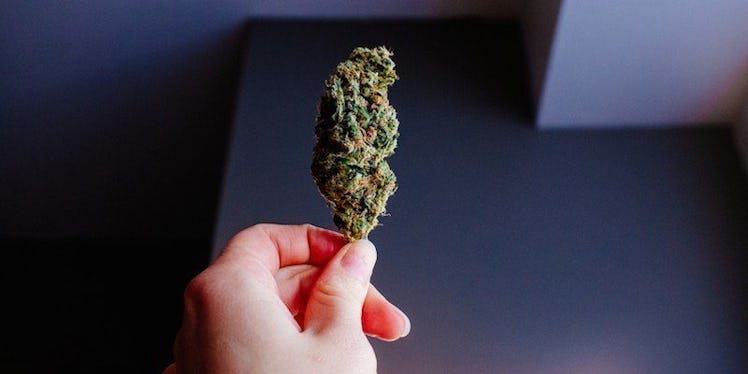
Here's Why Millennials Are The Only Ones Who Can Save The Marijuana Movement
Ever find yourself watching a Michael Moore-type documentary on Netflix and wish you could travel back in time to stop the lawmakers/board of directors/voters from passing that fateful legislation/resolution/initiative that led to the horrific outcome now being distilled into a 90-minute film or docu-series?
Well, this is your moment, champ.
If our generation doesn't look beyond simply making marijuana legal, we could be the ones being mocked for our inaction in future documentaries.
There's more to consider than simply decriminalizing the flower: environmentally-conscious cultivation practices, living wages and employee wellness, the disruption of monolithic business, opposition to systematized corruption, the battle for equal pay.
The importance of weed legislature affects more than you might think. This pungent plant has a lot of political potential.
We're fighting for economic opportunity.
Remember the market crash?
While much of the American public seems to have forgotten the root causes of the great recession amid a flurry of reports of our economic recovery, Millennials are still clawing their way back to solvency.
Articles on how we live at home, are taking desperate measures to find greater liquidity and delaying having children abound.
Marijuana promises to bring the economic stimulus the government can't provide in the form of a new industry, ripe with potential for innovation and job growth, allowing us all to fulfill our dreams of paying Sallie Mae back.
But we must be cautious. Legalization alone will not be sufficient if we don't scrutinize the actual substance of the legislation and take an active interest in the development of marijuana regulations.
As we've seen in Ohio, the same folks who brought us the "too big to fail" theory would take advantage of the public's liberal-leaning stance toward marijuana to create pot empires for themselves.
Even well-intentioned legislators may create nonsensical systems, such as the one in New York where the entire state is to be served by four licensees. (California, by contrast, is reported to have more than 50,000 marijuana businesses. The city of San Francisco alone has more than 20 licensed dispensaries.)
Millennials should focus on legislation that creates an open marketplace where there is access to banking and loans, so we can start to open businesses and create our own economic opportunity.
We want job growth and economic opportunity too. Why not create a system ready to absorb the many inmates who will be released under new federal and state re-sentencing guidelines?
We're fighting for education.
We were lied to as children of D.A.R.E., and there are interests that would continue to delude the American public into believing the prohibition of marijuana is necessary to rooting out the underbelly of society.
But thanks to the proliferation of alternative news sources and anti-prohibition organizations like NORML, SSDP and the Drug Policy Alliance, we now have the advocacy tools to stop the continued waste of precious public dollars and miseducation.
Mythical, crack-addicted welfare queens must take a stand and no longer permit the continued S.W.A.T. team-led raids in states where adult use is sanctioned, stop the proliferation of regressive anti-drug legislation, and refuse to allow another generation to grow up misinformed about drug use.
At a time when there is a national, bipartisan consensus to reduce the US prison population, we must take a stand to stop more people from going to jail over the cultivation of a harmless plant.
It's time to return the US to a state of sensible drug policy, a move that would begin to turn the tide on a global drug policy that has largely been determined by US coercion and bullying.
Funding War on Drugs turmoil in other countries has lead to the global failure to eradicate illicit drug production, sale and consumption we face today.
We're fighting for innovation.
According to Pew Research Center, ours is the most ethnically and racially diverse generation to come of age in the US. From the melting pot of the 90's emerged a generation that speaks the language of intersectionality, racial solidarity and social justice.
We have contributed to significant social change: the election of America's first black president; a resurgence of civil disobedience in the face of continued police violence forcing a national conversation on the role of race in policing; the creation of a multitude of web- and phone-based platforms, sharing systems and businesses aimed at solving issues such as discrimination by taxi drivers (rideshare services), wasteful disposal of excess pharmaceuticals (SIRUM) and lack of access to traditional lending sources (crowdfunding).
Why not put our $1.3 trillion education to collective use and start innovating in the marijuana sector?
We're fighting for for decriminalization.
While we were learning to read, our leaders were instigating a set of policies that led to the prison overcrowding seen in California.
They implemented discriminatory police practices such as the Stop and Frisk policies recently ruled unconstitutional in New York. They instituted a score of ineffective anti-drug programs that succeeded only in ballooning the size of our prison population.
News media has helped shape a negative view of the marijuana user, churning out reports that seem to put forth marijuana use by a suspect killed in custody as a legitimate reason for killing that person.
Are we too stupid, jaded or busy to ask what an individual's marijuana use has to do with being shot while clutching a bag of Skittles and a soda or being found hanged in a jail cell?
Legal regulation of marijuana will end the criminalization of nonviolent drug users.
But until we can no longer brand an individual socially deviant based on his or her consumption of cannabis, we will not see true justice play out.
This post was originally written by Sunshine Lencho for The Kind.
Citations: Only Millennials Can Save The Marijuana Movement - Here's Why (The Kind)